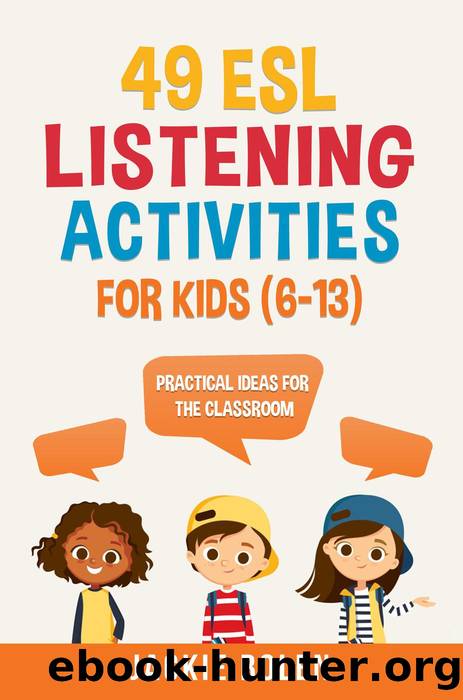49 ESL Listening Activities for Kids (6-13) by Jackie Bolen

Author:Jackie Bolen
Language: eng
Format: epub
Tags: esl listening, esl listening activities, esl listening games, esl lab, esl listening activity, esl listening game, esl listening test, esl listening lab, how to teach listening, how to teach listening esl
Publisher: Jackie Bolen
Published: 2020-06-08T00:00:00+00:00
Do you _____?
Skills: Writing/speaking/listening
Listening Sub-Skills: Predicting content, listening for key words
Time: 15 minutes
Level: Beginner-intermediate
Materials Required: Strips of paper (or students can make their own)
Prediction is a key skill in listening. Listeners gain clues from the context and in this activity, there are only a few expected questions each student will hear as they themselves wrote the answers. Some other sub-skills are listening for key words (verbs/nouns) and context clues, or asking a speaker to repeat themselves, explain a word or speak more slowly.
If youâre teaching beginner level students, consider writing interesting fill in the blank sentence forms on the board to help them; this will reduce the chances of students practicing (and potentially fossilizing errors) incorrect sentence forms when speaking, and the listener hearing them tooâit also reduces the time it might take for you to check every paper and make corrections before the activity begins. For beginner level students, itâs also a good idea to do a brief review of vocabulary and phrases from previous lessons that will help them produce answers that facilitate the students asking questions being able to find matchesâotherwise, the activity may deteriorate into chaos.
Once the answers are completed, collect them, mix them up and distribute them back to your students (three per student). At this point, everyone stands up and goes around the class asking questions to try to find the owner for each paper that they have. If someone is done early, you can give them another paper from the reserve pile that you have (remember that each student made five papers but you only handed out three per student).
Students have to listen carefully to the questions from other students in order to see if it matches them. It's worth mentioning specifically to students that this is a listening activity that focuses on making questions in English, not a reading one so that they're not to read other students' papers.
For example:
"Did you go to _____ middle school?"
"Do you have a twin brother?"
"Do you love to play soccer?"
Teaching Tip:
Students need to write down interesting and unique things about themselves. For example, âI go to XYZ universityâ is something that every other student in the class will say yes to so it is not a good thing to use.
Procedure:
1. Give students five strips of paper (or they provide their own).
2. Students write down one interesting thing about themselves on each paper. The teacher can monitor and assist students with this as necessary as well as correct some errors.
3. Collect papers and redistribute (three per student).
4. Students stand up and go around the class, asking their classmates, âDo you have a twin brother?â âCan you play the piano really well?â based on what is on their papers.
5. If it's a match, they get one point and that paper is âfinished.â Optionally, you can require higher level students to ask 1-3 follow-up questions before they get a point.
6. If a student finds all their matches, they can get one or two more papers from your reserve pile.
Download
This site does not store any files on its server. We only index and link to content provided by other sites. Please contact the content providers to delete copyright contents if any and email us, we'll remove relevant links or contents immediately.
The Art of Coaching Workbook by Elena Aguilar(51173)
Trainspotting by Irvine Welsh(21644)
Twilight of the Idols With the Antichrist and Ecce Homo by Friedrich Nietzsche(18626)
Fangirl by Rainbow Rowell(9229)
Periodization Training for Sports by Tudor Bompa(8254)
Change Your Questions, Change Your Life by Marilee Adams(7762)
This Is How You Lose Her by Junot Diaz(6877)
Asking the Right Questions: A Guide to Critical Thinking by M. Neil Browne & Stuart M. Keeley(5762)
Grit by Angela Duckworth(5609)
Red Sparrow by Jason Matthews(5468)
Paper Towns by Green John(5181)
Room 212 by Kate Stewart(5105)
Ken Follett - World without end by Ken Follett(4723)
Housekeeping by Marilynne Robinson(4436)
The Sports Rules Book by Human Kinetics(4379)
Papillon (English) by Henri Charrière(4263)
Double Down (Diary of a Wimpy Kid Book 11) by Jeff Kinney(4261)
The Motorcycle Diaries by Ernesto Che Guevara(4090)
Exercise Technique Manual for Resistance Training by National Strength & Conditioning Association(4063)
